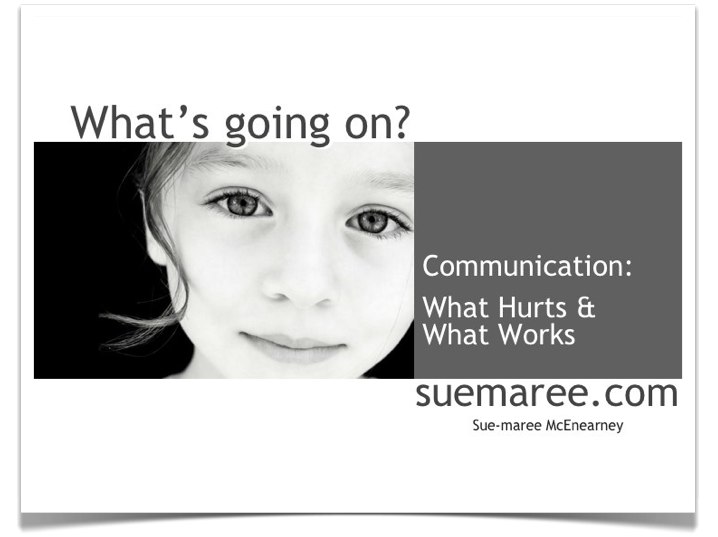
Top 10 Behaviours that Peeve People Off
How often do you run into PPO's? (Behaviours that "Peeve People Off"!)
I often see people dishing out PPO's. Sometimes other people are on the receiving end. Sometimes it's me on the receiving end!
PPO's create problems between people in just about every workplace and every home every day - creating stress, anxiety, ill-will, distrust, payback, retaliation - ouch!
So in the interests of better relationships - both personal and professional - let's check out a list of the "Top 10 PPO's":
At number 10: Taking priority over others.
No discussion, no agreement… people taking priority over others just because they want it, and can get away with it!
Number 9: Making assumptions about others.
People making assumptions based on limited (and often selective) information. Just as others don't know the totality of what's really going on with us, we don't know the totality of what's really going on with others!
Number 8: Jumping to conclusions about others.
Ditto. What applies to making assumptions also applies to jumping to conclusions. People jumping to conclusions based on limited (and often selective) information. Just as others don't know the totality of what's really going on with us, we don't know the totality of what's really going on with others!
Number 7: Forcing responsibilities on others.
No discussion, no agreement. People using whatever level of manipulation/deception/coercion/force it takes to get others to do what they want!
Number 6: Taking responsibilities from others
Again, no discussion, no agreement. People using whatever level of manipulation/deception/coercion/force it takes to "take over" others rightful responsibilities - with or without their knowledge.
Number 5: Setting limits and dictating rules... and imposing them on others.
No discussion and no agreement. People setting limits and dictating rules that work for them, then using whatever power they have to impose them on others.
Number 4: Making decisions... and imposing them on others.
Again, no discussion and no agreement. People making decisions based on whatthey think is "best" or "right" then using whatever power they have to force them on others.
Number 3: Demanding compliance and obedience from others.
People demanding others do what they want / need / think is "right". As if their way is the right way, and other people's wants and needs are less important than theirs. Again, no discussion and no agreement.
Number 2: Manipulating behaviour with rewards and/or punishments.
People rewarding and punishing others using whatever power they have to bestow or withhold based on their judgement of how well other people "measure up" to what they think is "right" or "acceptable".
At Number 1 on our list of Top 10 PPO's (drumroll please!) basically, what most PPO's boil down to:
Number 1: Abuse of Power.
People using "power plays" to manipulate/deceive/coerce/force others to do what they want - at others expense!
"Hey! What's going on??!!"
It's easy to see how behaviours like these PPO! ("peeve" being a gross understatement in many situations!).
3 questions to improve your communication skills (and your relationships!):
- When (if ever) am I on the receiving end of PPO behaviours?
- What do I typically do when I'm on the receiving end?
- When (if ever) am I dishing out PPO behaviours? (Even without realizing it?)
If you'd like to share your experiences of PPO's you're welcome to add your comments to the blog.
If you'd like to understand more about what's going on in these situations, and what you can do to handle situations like these without striking out, or sucking it up. If you'd like to handle even the most difficult situations with respect for yourself and others - with class and style you can be proud of (and other people will admire) - it's absolutely doable, in fact it's easy… when you have the right skills.
In the coming weeks in the h-spot emails and blog posts, I'll be sharing information about why people use PPO's, how to communicate without using PPO's, and how to deal with it when other people are using PPO's on you! In short, "what hurts" and "what works" in communication.
If you'd like to get the information sooner, and in one hit - it's all in my new book:
'What's Going On?' Communication: What Hurts & What Works
Today I'm releasing the digital version of the book to h-spot subscribers.
For a limited time, it's available at the release price of $10 plus GST (Total $11 Australian). Being digital it downloads immediately and within minutes.
Read more about it here
Buy the book here
To set it up so there's no risk to you, it comes with a 100% 365-day, no-questions-asked, money-back guarantee. So if, for any reason, you don't like it I'll refund the purchase price in full, no questions asked. And I'd be happy for you to pass it onto someone you think would like it.
If you're experiencing stress in relation to PPO's, I believe the information in this book will give you a perspective on what's going on, and the skills to handle it, that will reduce (even eliminate!) that stress. I know it works for me.
Until next time...
Here's to better communication creating better relationships - both personal and professional!

 Wednesday, March 10, 2010 at 7:15AM
Wednesday, March 10, 2010 at 7:15AM 




